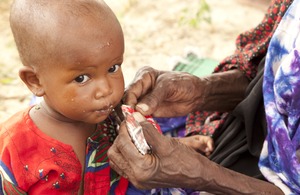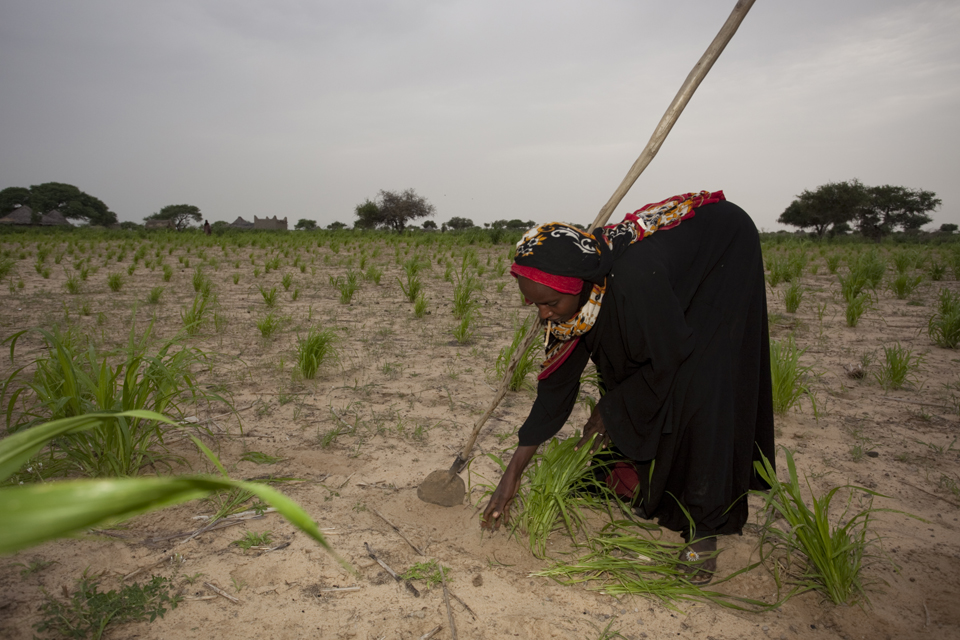Tackling malnutrition, providing hope in western Chad
Working with Action Against Hunger to alleviate the Chad food crises

2 year-old Achtor is severely malnourished. She and her grandmother, from drought-stricken western Chad, live in poverty and struggle to get enough food. Picture: S. Hauenstein Swan / Action Against Hunger. Used with permission
Tackling the devastating food crisis in Chad
Four year old twins Cherefie and Acete are hiding shyly behind the cloth which serves as the entry to their hut, in the Sahel region of western Chad.
Both children are suffering from severe acute malnutrition, a condition which can be fatal if left untreated. But they are a lot better than they were just a few weeks ago, thanks to UKaid funding from the Department for International Development.
Chad has suffered prolonged droughts, poor harvest and most recently, devastating floods. These ‘weather shocks’ have exacerbated an already chronic food crisis and one in every four children under 5 suffers from acute malnutrition in the west of the country. Without life-saving treatment, many of those who go on to develop ‘Severe Acute Malnutrition’ are at immediate risk of dying.
DFID is funding the NGO Action Against Hunger (ACF) to help respond to the food crisis in Chad, as well as to similar humanitarian crises across West Africa. In Bhar El Ghazal, western Chad, this support is helping ACF to run mobile clinics, identify and treat severely malnourished children and run an Emergency Nutritional Programme.
Setting up mobile clinics
When Cherefie and Acete became weak and started suffering from fever, the village chief told their mother Fatima to bring them to one of Action Against Hunger’s outpatient mobile clinics. The mobile clinics regularly visit remote villages to detect and treat malnutrition in young children, as well as providing health and nutrition education, and referrals of complicated cases of malnutrition to the regional hospital for intensive care.
At the mobile clinic, the twins were measured and weighed, and received medical care. Both children were put on a treatment programme with specially formulated micronutrient-enriched food, such as high-energy peanut paste, that’s ready prepared for use at home. For the past few days, Fatima has been feeding the twins with this therapeutic paste at regular intervals, as instructed by the health workers. Once a week, the mobile clinic returns to the village and Fatima takes the twins to this clinic to monitor their progress and for any required follow-up care.
Getting better, hoping for better times
“The last two years have been very difficult,” said Fatima. “We’ve run out of food. Our sheep are not producing enough milk because they are hungry too. Our livestock perished and we cannot afford the food at the markets. My husband left to go to the North, to look for work. He’s been gone for many months now and occasionally he sends us some money; but there are so many mouths to feed; my youngest daughter is only a few months old.”
With no other ingredients available, Fatima starts diluting the burnt leftovers of her neighbour’s millet porridge with water to prepare what she refers to as ‘bule’ - the family’s only meal today. She hopes that her sheep will give birth so she will be able to sell the lamb and generate some income.

This small millet field in western Chad will probably produce just 2 to 3 bags, which will only last the family that farms it for 3 or 4 months. Picture: S. Hauenstein Swan / Action Against Hunger. Used with permission
Meanwhile, she continues to feed the twins with the therapeutic peanut paste provided by Action Against Hunger. “Cherefie and Acete are already getting better and are out and about playing again. I hope that times will get better so that my children don’t fall ill again.”
Immediate assistance, long-term solutions
According to recent nutrition surveys carried out by Action Against Hunger, one out of every four children under five suffers from acute malnutrition in the Sahel region of Western Chad.
Whilst the region frequently experiences high acute malnutrition rates that exceed the emergency threshold rate (set by the World Health Organisation) during the “hunger gap” season – a period of routine scarcity between harvests– the last two years have been particularly harsh. Drought and erratic rainfall have pushed nearly two-thirds of households into food insecurity. Problems with access to arable land, water and health care have also contributed to skyrocketing malnutrition rates.
The current food crisis has been devastating for families in this isolated region of Chad and across West Africa. Both immediate assistance to save malnourished children and long-term solutions such as income-generating activities and farming are crucial to address the situation and avert future crises.